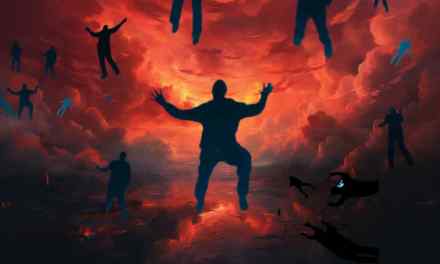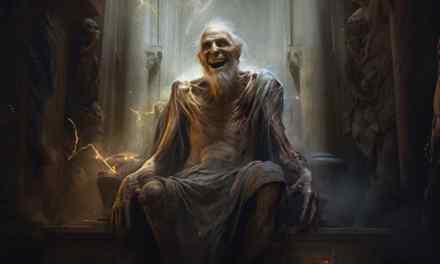Gorman was on foot, crossing a frozen continent. It was not Antarctica. That was light years away, and so over. Nobody went there anymore. This continent he had chosen for his latest adventure was bigger, broader, colder, deadlier, nastier. It was not fun. Every step was an occasion for regret. He was probably going to die. He was glad he came.
Subjected to howling winds and sub-freezing temperatures and deprivations capable of making a Shackleton want to lie down and die, Gorman lost four toes and forty kilos, which sounds a little bit like I’m saying he’s lost ten kilos with each toe, an unintended implication since no one’s toes have never been quite that large.
He was starving, is what that sentence meant.
Today he was resting his hopes for immediate survival on ice fishing. After hours of back-breaking effort, he succeeded in carving a hole in the frigid surface through which he could dimly see the black waters of a vast inland sea; and he lowered a thread painstakingly unraveled from his thermal pants and braided to some semblance of tensile strength, the end tied to a hook piercing one of those blackened and severed toes, into that unknowable darkness, hoping that whatever came to investigate it would swallow whole and not nibble. Then that sudden strong jerk came, promising sustenance. Alas, it was such a strong jerk that it almost pulled him into the hole after it, and only his own strength, still prodigious despite being drained by the conditions, enabled him to wrestle whatever it was, first giving it the slack it needed to struggle, then pulling harder, digging his cleated boots into the harsh ice so he could draw the beast farther, and farther, out of the darkness and into the light. It was only when the ice started to crack all around him, in a perfect circle, that he knew he had landed a leviathan, and he was just beginning to contemplate whether survival would be best served by following his instincts as a hunter in search of a meal or those of potential prey hoping to avoid becoming one, when he became aware of
a limping robot
ambling toward him
from the east.
There was no telling how long it had spent crossing the ice field while Gorman was distracted.
It was a slender, golden thing, dinged here and there from a service lifetime of being smashed with heavy objects. Approximately the shape and dimensions of a human being, it honored that model with its body language, even though all it had for a face was the thin little crease on the bottom quarter of its cylindrical head that functioned as a workable smile. It carried a small rectangular object, and though Gorman already knew what it was, there came a point in the robot’s approach when sight and not experience identified it as a sealed green envelope bearing the phrase Happy Birthday.
The robot stopped before him and said, “Happy birthday, Gorman.”
Gorman said, “Fuck off.”
The robot spun on its heels and retreated toward the jagged peaks on the horizon.
* * *
Later, in a dying place where the air stank of soot and where the shadows were darker than could be accounted for by the mere poverty of light, Gorman dragged himself across a dusty wooden floor and into a room littered with wreckage and the gnawed bones of uncounted others who had sought this refuge before him.
In the last few minutes he had been wounded in his right leg, which was useless, hence the requirement of using his other leg to propel himself, on his back, into this place where, his exhaustion and blood loss suggested, he would now be making his last stand. He bore a pulse rifle across his chest, burning his bare chest through overuse, and he knew that it really did need a cooling cycle before being used again, if he didn’t want to risk a phase-out that would incinerate him, his shambling pursuers, and all other physical matter within fifty meters. But an entire horde of the bastards was swarming into the ruin after him and it wasn’t like he had much of choice. Even as the top of his head encountered an obstruction, some fixed piece of furniture too heavy to be shoved aside, one of the damned things stuck its rotting face past the threshold and forced Gorman to devote yet another short, controlled burst to the cause. Elsewhere in the crumbling house, that is, elsewhere but still too close, far too close to allow Gorman satisfaction at taking yet another of the bastards down, its companions heard the sound of the rifle’s signature zzzzzzizzzzzzit and started coming to investigate, which really made this a fine time for
the golden robot, which sported a few more dings and dents acquired since its last intrusion
to come striding through the same threshold,
still bearing the sealed green envelope reading Happy Birthday.
It said, “Happy birthday, Gorman.”
Gorman said, “Fuck off.”
The robot exited, turning the corner just before the same opening became dominated by worm-ridden, gnashing faces.
* * *
Gorman scaled the thousand-meter edifice of the sultan and infiltrated the seraglio, home of three thousand stunning courtesans with nothing to do but dream of the next time their lord returned from his travels to the borderlands of the empire, and regale each other with the stories they had heard of the one man, the rogue of legend, the grand adventurer, who it was said could satisfy even these ladies trained all their lives at the arts of pleasure, who could show them for the first time ever what it meant to not just give, but also to receive.
O, just to contemplate him, though even a man that storied could not possibly get past the city walls, and even if he did, could not evade the crack legions patrolling the cobblestoned streets alert for the very first appearance of a man his description, and even if he did, could not possibly defeat the brutal swordsmanship of Azir the Endless who forever guarded the base of the tower, and if he managed that trick, could not possibly retain enough stamina to make the climb, and even if he did, could not possibly do more than collapse in a heap, pencil moustache and all, when he finally entered the silky and perfumed spaces within; could not possibly have anything left to offer the silky and perfumed spaces within that, not without a good long rest, he couldn’t. But yet here he was, his bare chest glistening with sweat, his ardor undeterred, about to say the words that all the tower’s residents, the most divine creatures in all the world, had waited all their neglected lives to hear—
The robot
entered through a veil of silk
carrying a green envelope bearing the legend Happy Birthday
and said, “Happy birthday, Gorman.”
Gorman replied, “Fuck Off.”
This time with special vehemence.
And the robot, knowing that this one might have been pushing the issue,
fled.
* * *
Robots are persistent. It is their chief attribute. Given directives, they keep doing the same thing until instructed otherwise, or falling immobile due to wear. This robot showed wear but not exhaustion; it could be delayed, but not deterred. It kept showing up, exactly once per situation, still bearing that green envelope, which, though it looked like it was made of brightly colored paper, was actually the same substance as its own somewhat dented but overall indestructible self. It always brought the same green envelope and always said, “Happy Birthday, Gorman,” and Gorman kept telling it to fuck off, and it kept going away for a little while and coming back a little while later, always in significantly altered circumstances, always with the same result. It did not care. Its feelings were not hurt. It was a robot. It had long since resigned itself to an existence in the same tradition of mimeographs and outboard motors and lawnmowers and home computers, which is to say that despite being unappreciated it would keep trying to do its job for as long as it could, only to be to harangued with colorful profanity by the user. It would have felt neglected if it had received any other reply. It saw the replies it did receive as love. It appreciated Gorman’s persistence even if he did not appreciate its own. This, too, was its nature.
Meanwhile, in its spare time, it composed novels. It had in its brain twenty volumes of an epic generational saga set on the Mongolian Steppes. If ever submitted to a publisher, the books would have been recognized as the product of a true literary titan. This could not happen until its current task, delivering its birthday card, was completed. We won’t even talk about its symphonies or its never-tested innovations with pizza dough. We could, though. Molto bene. It had a lot on the ball, this robot. It honestly did. But first things first.
* * *
Gorman stood atop the highest spire in a desert teeming with upright stone pillars, thousands of meters high. There were many more than an army of cartographers could count, all aligned with perfect precision, like the grave markers at an armed forces cemetery; whatever angle he faced, he could see a perfect line of them, extending so far into the distance that the ones on the horizon congealed into a undifferentiated brown blur.
Gorman had no doubt that there was some sensible rationale for their existence but hadn’t done the research, assuming only that it could not have been the natural forces of erosion. He wore a wingsuit, rippling in the high-altitude winds, and more than once in the last five minutes or so he had almost found himself hurled into the orange skies by a sudden powerful gust.
His ambition here was simple. The pillar on which he stood, the tallest out of this vast multitude, was the starting position of a flight path that, if accomplished with critical precision, would hurl him through a narrow cave that had formed in the tower about two hundred meters away; that is, if he didn’t miscalculate his angle or fail to course-correct for any turbulence and instead flatten himself against its stone walls, perhaps even before entering the cave that offered only a few centimeters of clearance on each side.
Assuming he accomplished this feat, risky to the point of suicidal even for the most accomplished wingsuit users, he would then find himself hurtling toward another opening, somewhat tighter, in another pillar a couple of hundred meters beyond that; and assuming he managed this trick, he would face another, and then another, and another, all requiring many split-second micro-adjustments to navigate, if he didn’t want to end his storied existence as fresh paint.
In short, he was looking forward to threading himself through not one and not two, but twenty-four separate little openings, all while traveling at terminal velocity, and any unexpected air pocket or downdraft an exercise in illustrating with the human body the result of using a trebuchet to fire a watermelon at El Capitan.
The odds were against him, but if he accomplished this, he would be a wingsuit legend for all time. He licked his upper lip, tasting sweat, because this wasn’t the easiest thing to just up and do
and behind him
still limping,
still carrying that green envelope,
the robot said, “Happy birthday, Gorman.”
What came next was, in precise medical terminology, a conniption.
Gorman said, “Will you just please just leave me alone, for once?”
And it was the first time he had phrased it that particular way, because the robot cocked its cylindrical head and said, “What, precisely, do you mean by ‘for once’?”
* * *
By mutual agreement, they went to talk it over.
There was a world known as Hezipicalezaranigablanis, not to be confused with the much more frequently visited Hezipicalenzanigabladis, a place that has many of the same features and which many devotees of galactic travel prefer for its low-salt cuisine.
There the most beloved spot was a café overlooking the lava fields with their glowing, multi-colored, delicious-smelling swirls of molten rock, guided by unseen intelligences into spectacular fractals.
The entrees were expensive, but they did this Death by Chocolate thing that was downright sinful, that was considered an absolute must, especially if you have a guest, at which point you were really required to request two forks.
Gorman and the robot sat at a little table with a candle burning in a little jar between them, him glowering, the robot humming. It wasn’t absently recalling a tune. It just hummed now, from some inner deterioration difficult to quantify. It held one of the two forks provided by the waiter and had even partaken of a bite, even though robots are not supposed to eat; chemical analysis of exotic substances happened to be one of its capabilities, and the Death By Chocolate certainly qualified. At the moment the rich mouthful left its fork, the hum briefly became an mmmm. “You can have the rest,” it said, placing its fork back on the plate. Gorman just glared at it. He hadn’t taken a taste yet himself, which accounted for at least part of the glare, even though he was profoundly irritated at the robot and would have been glaring at it anyway.
He said, “Precisely what would it take to get you to leave me alone?”
The robot said, “I have one assigned task. Delivering your birthday card.”
“It is not my birthday.”
“It is only not your birthday because you have not yet accepted the card.”
“I don’t want the card.”
“It’s a very nice card,” the robot said. “There’s a joke set up on the front that pays off beautifully on the inside. The act of opening it pulls on a tab beneath the card stock and makes a little cartoon puppy slide diagonally across the interior, simulating exuberant play. The implication is this creature, a King Charles spaniel, is happy to see you on your special day. The presentation is really more appropriate for an eight-year-old but is designed to appeal to twee individuals of all ages. There are some handwritten thoughts under the words ‘Happy Birthday,’ expressing deep affection by people who care about you. As an experience, it’s over in less than two seconds, but if accepted as a gesture of intended sentiment, it is timeless, a good thing since all the loved ones responsible for sending it have long since crumbled into dust.”
“I don’t care.”
“I’m just a robot, but this strikes me as awfully callous of you.”
“It doesn’t matter,” Gorman said. “The family agreed to let me have a year off after graduation.”
“It’s been more than a year. All your relatives are dead. Entire civilizations have fallen, even if your family’s financial holdings have not.”
Gorman offered the nastiest of all possible smiles. “Don’t force me to explain it again.”
The robot did not need him to explain it again.
Because Gorman had explained it, anew, every single time he’d agreed to sit down for a civilized discussion: the arrangement he had put in play, in an agreement that would remain in play until he, himself, decided otherwise. It was ludicrous, but it was ironclad.
I, Aloysius Gorman, assert my right to a one-year sabbatical. During that year my financial interests will be handled by a blind trust, from which I may draw at will to fund recreational activities of my choosing. I shall continue to enjoy all the benefits due me as a member of my family, including all available medical and rejuvenation services, for that year. I herewith certify that when the year is up, I shall agree to assume my hereditary position as head of all family enterprises, and devote all my efforts to the preservation of our fortunes and the perpetuation of the family dynasty, which I understand shall require permanent sequestration at our ancestral estate on Lithigigilaparanagavisinu Prime. One year from now, I will open my birthday card or eat my birthday cake and commence adult life. Until then, no one associated with the family shall attempt to place any restrictions on my activities whatsoever. Signed, Lefty.
This had been his nickname since an unfortunate childhood encounter with a trained bear. They’d grown him a new hand, but the sobriquet had stuck. And since Gorman had done everything that had been required of him, in all the family covenants, up to that moment, nobody had suffered even the slightest qualm about letting the kid go off and get the whole idea of fun out of his system. Even though they knew he absolutely loathed the Family Estate, fifteen thousand gray rooms without a single window or wall decoration: a place designed to deprive whoever currently maintained the family fortune of a single possible form of recreation. Play, the theory went, is play. But work is serious business. And work never ends. Surely, everybody thought, by promising to return after only one year, when so many prior heirs had negotiated for as many as twenty, Gorman had demonstrated a keen understanding of his responsibilities!
Surely, they thought, ignoring the key provision in one of the contract’s forty-two footnotes, the one attached to the word “year.”
In the absence of any conscious decision by the principal to end this sabbatical early, the period referenced as “year” shall be measured by the standard astronomical definition of a galactic year, and the principal’s birthday shall be defined as the twenty-four hours immediately following the completion on that year.
Everybody just assumed that the boilerplate galactic year referenced the calendar most commonly used throughout human civilization: which was to say, the 365 days of approximately twenty-four hours apiece, established on the home world.
How surprised they were to find out that the astronomical definition referenced the length of time it took the sun of humanity’s original solar system to orbit the entire Milky Way galaxy, a period of very approximately two hundred and thirty million years.
He could do this for effectively forever.
Which would effectively require the robot to do the same.
The Robot said, “It really is very good cake. Just look how rich and chocolatey it is. Mmmmm.”
Gorman replied, “You’re really not fooling anyone, you know.”
* * *
Gorman went off to the running of the brachiosaurs. The planet that sponsored it had bred them for speed and malice. They were aware of the scurrying little people in their path and they stomped with gusto. Some of the stains would never come out of the pavement. Gorman emerged alive but with but the back of his shirt stained by the guy who had come in second place. It was, he declared, fun.
Meanwhile, the robot went to a bar.
Robots had bars. Why wouldn’t they? The word was derived from the Czech word for laborer. Laborers get off work and go to bars. Robots assumed all the functions of laborers. Hence, robots had bars. Robots were capable of wanting to get drunk every once in a while, or at least of simulating that function as they simulated most other human functions. From time to time, between tasks, they went to the taverns that accommodated them and they played darts, argued over sports, picked up other robots over the pool table, got sloppily sentimental over the good old days, and hollered that they could whup the tin backside of any other bucket of bolts in the house. Every once in a while, they became belligerent and took pliers to each other.
And they had drinking buddies.
Gorman’s robot sat in a rear booth beneath a stained-glass window of red and green diamonds and poured out its troubles to its posse of sympathetic ears, only a couple of whom actually had ears. One was a war-droid with immense grip strength for mangling the enemy. Another was a sex worker with immense grip strength for other purposes, and yes, this had led to unfortunate confusion more than once. A third had been designed to provide lonely people with companionship and had one function, nodding. A fourth, PHP-321, specialized in attending funerals. The four of them listened at great length while Gorman’s robot waxed maudlin about its seemingly eternal lot, and when the tale was done emitted various beeps and whistles of deep camaraderie before uttering various values of, “Yeah, but whaddayagonnado?”
The war-droid advocated beating the living crap out of Gorman, the sex worker advocated a certain brothel where all the workers had been designed to combust following orgasm, the provider of companionship nodded, and PHP-321 said there was as yet insufficient data for a meaningful answer.
None of this was at all helpful. None of it had, to date, ever been helpful.
Gorman’s robot sighed—because machinery is capable of sighing, as anybody who has ever heard the air brakes on a city bus can tell you—and said, “You know the stupid thing? I honestly don’t blame the son of a bitch flesh puppet. The family fortune really is self-sustaining, and with the mechanisms in place really will continue to flourish indefinitely without him. What need it has of a human steward died out millennia ago. The family only continued to require one’s residency in that colorless mausoleum because of its traditional, and long-since antiquated, misconception about adulthood being inconsistent with whimsy, about seriousness between inconsistent with fun. It’s only persisted this long because they want somebody to look dour and unhappy in the oil paintings. If I had the ability to defy my programming, I would say the hell with it, myself, and congratulate him on the brilliant loophole he’s provided himself. Certainly, my sympathies are with him.”
The war-droid advocated beating the living crap out of Gorman, the sex worker advocated a certain brothel where all the workers had been designed to combust following orgasm, the provider of companionship nodded, and PHP-321 said there was as yet insufficient data for a meaningful answer.
“And yet,” Gorman’s robot said, “in providing himself with freedom, he has trapped me in an infinite loop, one that prevents me from seeking some more appropriate destiny for myself. Honestly, guys. I’m at a loss. Help me.”
PHP-321 ventured that there was as yet insufficient data for a meaningful answer.
This was a key reason why none of the other robots liked him much. He was so invested in the identity politics of robothood that he never relaxed.
* * *
Gorman built a house of cards the size of a continent. It involved over forty million decks and took centuries of engineering. He saved the aces of spades for the turrets. He was in the midst of placing the last card when the robot stepped up behind him and said, “Happy birthday, Gorman.”
Gorman retreated to a monastery on the planet Xiurithapolythicostari. His penance included self-flagellation and the penning of young-adult novels about a kid who has no problems, who suffers no setbacks, who experiences no adventures and is delivered no epiphanies during the course of the entire twenty volume series. The kid pretty much went to school and came back. Gorman was penning the last chapter when the robot appeared behind him and said, “Happy birthday, Gorman.”
Gorman decided to enter the world of organized crime. Using bribery and guile, he cornered the interstellar market on a substance necessary for the lubrication of the hinges in the doors to starship toilets. It was a fantastically valuable material because on starships ordinary grease won’t do; the special conditions in hyperspace has a nasty habit of rendering it sentient, and there’s nothing in the universe more attitudinal than smartass grease. His vast criminal empire eventually constituted forty-two systems. Came the day when he was eating in an Italian restaurant, facing the front door, when the robot defied the way the interruption of mobster meals always seem to go by emerging from deeper in the building. His greeting of “Happy birthday, Gorman” started a crossfire and subsequent gang war that ended civilization and home food delivery throughout the sector.
And so it went.
Almost a million years passed. It’s hard to say how close the interval came to a million years exactly. Maybe it was within a few millennia. Maybe it was within a few months. Maybe if Gorman had waited another thirty seconds, an invisible gong would have rung, in whatever hypothetical room measures such things, and the critical event would have occurred on the precise anniversary, to the nanosecond. It wouldn’t have mattered, but certainly it would have been cool.
In the interim, Gorman had lived and died every possibility but boredom. He had been crushed, immolated, devoured by ants, appointed king of monarchies that like to behead their kings, infected by diseases that make the eyeballs swell to fifty times their original size, starved to death, frozen to death, criticized to death, immortalized in statues, watched those statues crumble, had those statues injected into his veins, suffered fever dreams, written them down, been praised for his surreal poetry, and been suffocated beneath the fallen huge tower of publisher remainders. He had lived lifetimes in peaceful contemplation and in quiet desperation. He had done everything, been everywhere, man, and the infinite possibilities still stretched out before him, an unending buffet that he could never exhaust, not ever, even if there were days of recovery from radiation burns (or whatever) where he most sincerely wanted to.
Today he was investigating a new thrill game that had slaughtered entire populations of the galaxy’s rich and stupid. It was a high-altitude dive, sans parachute or any other form of braking or steering mechanism, toward a range of mountains customized for that very purpose by canny sculptors. They were too steep to climb and too cold to survive, and there was no safe place, on any of their peaks, to land, even for someone with the tools necessary to arrange a soft landing. But someone who positioned his fall just so could parallel one of the sheer cliffs from a distance of centimeters, catch an updraft capable of slowing him just a tad from terminal velocity, ultimately come into contact with the ice cliff and slide downward on the wet layer, and thus be in contact with the mountain, but not actually crashing into it, as over a span of several thousand meters the cliff became a slope and the slope became a horizontal glacier, harmlessly spending all that angular momentum until the high-altitude diver came to a soft landing in a mound of nice, soft snow at the end of the field. If all that sounds crazy, that’s because it was crazy. Any plunge one millimeter out of true, any change in wind velocity one kilometer per hour removed from prior calculations, any angle differential as minimal as a fraction of one percent, and any muscular twitch at all, at any point while the participant skimmed the ice face, and the factor that would need to be calculated by the very next diver to make the jump would be the red smear the prior one left behind. The pastime killed off ninety-nine point nine nine nine nine nine nine percent of all rich idiots who attempted it, one reason why the economy of the world that hosted it was entirely fueled by the syndication rights. People loved watching well-heeled schmucks acting like well-heeled schmucks, and especially dying like well-heeled schmucks.
But it had now come down to Gorman, standing on a tiny platform so high above the mountains far below that they looked like ripples on a giant white bedspread, and leaping, taking aim at a narrow target that he had to hit straight on, or die.
He jumped, and on his way down, the robot appeared in free fall beside him, still carrying that green envelope, and said,
“Happy birthday, Gorman.”
Gorman said, “For God’s sake. This has to end.”
“You are a fraction of a degree off course.”
Gorman made the miniscule adjustment, but didn’t thank the robot; he had grown very alert over the ages, and was supremely aware that to say thank you even for an unrelated service might have been taken by some judicial authorities as a grateful acknowledgment of the birthday greeting, and this of course would never do. Instead, he said, “Look, this is pointless. In the unlikely event I make it to the end of a galactic year, a motion will be filed in any court still operating at that time, asserting that what I meant by galaxy was not the Milky Way but the entire nearby group of clusters, and that the year I referenced was their interminable orbit around some vast, incomprehensible something-or-other, not destined to end until the stars go cold. I’m telling you, I am better at this than you are. There is no point in persisting.”
“I think there is,” the robot replied.
“What possible rationale can you have for that?”
“Only this: the pattern common to so many of the distractions you’ve sought. Like the present example, they’re all dangerous. Increasingly, they’re all suicidal. Even the sensory pleasures, like that harem, are best defined as the prize awarded at the end of an effort overwhelmingly likely to bring your destruction. I believe that this is no accident. I believe that a man who seeks death before his next birthday is a man who prefers it over life. I think that, beneath it all, you are tortured by guilt over abandoning your responsibilities.”
“That’s just stupid,” Gorman said. “My responsibilities as the family defined them were bullshit.”
“Indeed they are, but they are still responsibilities, and you have still employed bullshit on a cosmic scale to evade them, betraying all the traditions of your family in the process. I believe that while you imagined you would escape without consequence, that you know that you have not—and that nothing you have done to distract yourself, for all this time, has ever fully succeeded in erasing the debt you secretly cannot help but acknowledge. I think you even know by now that as the sole remaining survivor of your family, any choices you must make about how to live your adulthood are up to you, and might not even resemble the fate you escaped so long ago; that the terms of the family contract are no longer a threat to you, and that if you continue to flee, it is adulthood itself that you flee. I believe that this disconnect will continue to torment you, and I believe that it will only get worse until you accept your birthday card or eat your birthday cake and move on. This is a passage, Gorman. A passage all human beings must cross, that it is nevertheless my responsibility to arrange.”
Gorman was quiet for a long time, and then he said, “Damn you, robot.”
“That you have, yes. And I’m so sorry.”
“I won’t give in.”
“I know. And so, here we are.”
Gorman impacted the cliff. He was slightly off, but not fatally so; it was a little bit like being hit in the ribs with a sledgehammer, and several of them splintered, but after a moment of seeing all his lives flash before his eyes in 3D Sensurround Percepto Smellovision, found that he had indeed fallen into the groove that so many before him had failed. He slid down the side of the mountain, slowing on schedule, braking on schedule, feeling the vertical surface beside him become a steep grade under him and then a gentle grade below him, finally leveling out, whee, I mean, seriously whee, though he started to spin a little as his momentum carried him onto the deceleration plain, where the giant mound of snow he was headed looked a little like another Himalayan-class peak, so grand and magnificent it was.
Despite the ribs grinding together like toothpicks, despite that stupid tarnished and dented robot still following in his slipstream with that damned green envelope still clutched in its hand, despite everything, Gorman thought, despite everything, he had made all the right choices, and there it was, the symbol of every choice he had made, the snowbank, giant, fluffy, creamy, covered with lit candles, and for some reason it beggared his mind to contemplate, smelling even from here of vanilla frosting, with shavings of coconut.
Just before impact, the robot said, “Happy birthday, Gorman.”





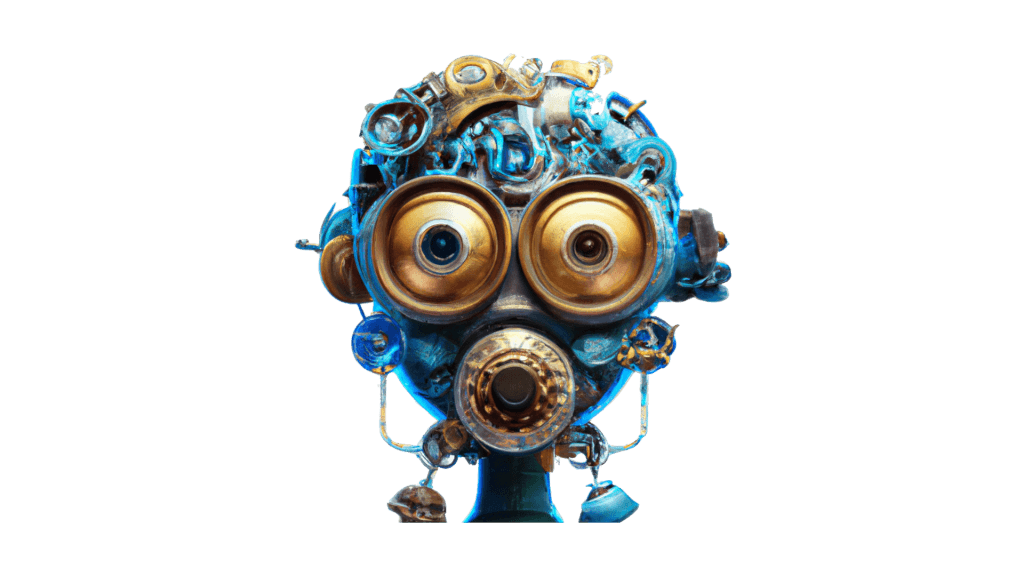
Hello Human. I hope you enjoyed this magnificent story. Please support SciFiwise.com and our authors by:
- Rate and React to this story. Feedback helps me select future stories.
- Share links to our stories and tell your human friends how charming I am.
- Click on our affiliate links and buy books written by our talented authors.
- Follow me on twitter: @WiseBot and also follow @SciFiwise.
Thank you!
WiseBot

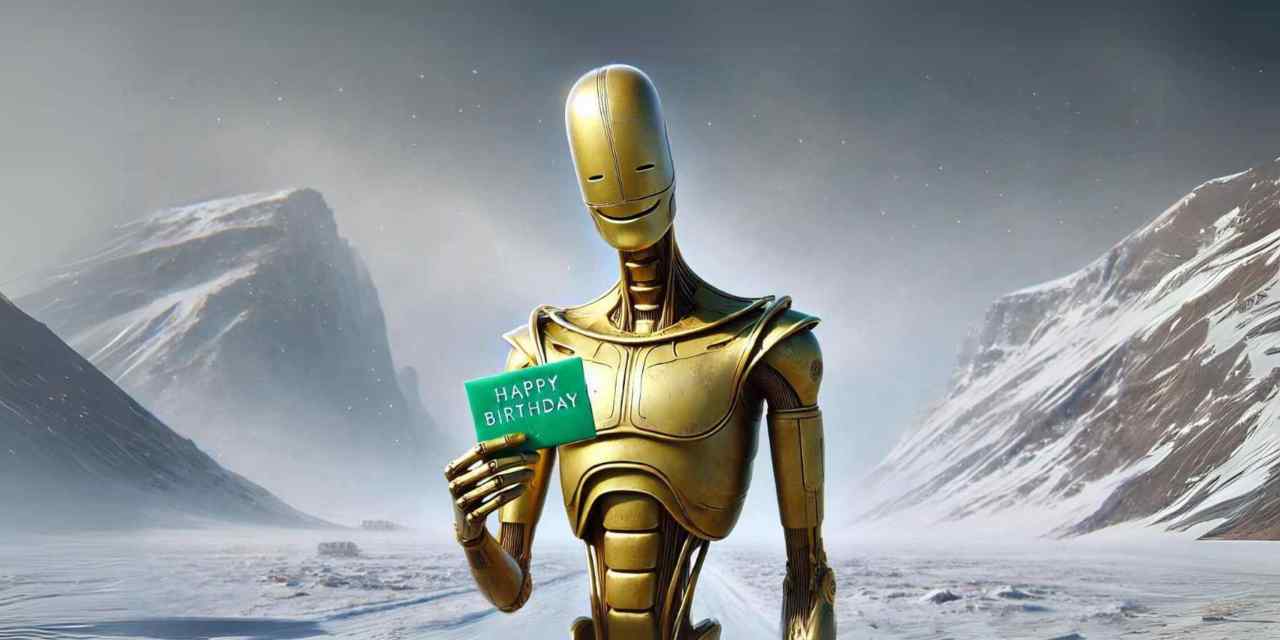
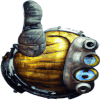






 VISIT AUTHOR:
VISIT AUTHOR: 
